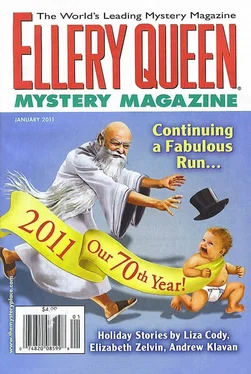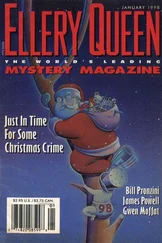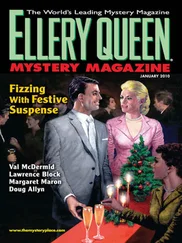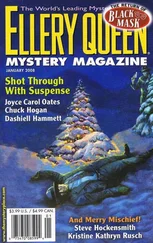Лиза Марклунд - Ellery Queen’s Mystery Magazine. Vol. 137, No. 1. Whole No. 833, January 2011
Здесь есть возможность читать онлайн «Лиза Марклунд - Ellery Queen’s Mystery Magazine. Vol. 137, No. 1. Whole No. 833, January 2011» весь текст электронной книги совершенно бесплатно (целиком полную версию без сокращений). В некоторых случаях можно слушать аудио, скачать через торрент в формате fb2 и присутствует краткое содержание. Город: New York, Год выпуска: 2011, ISBN: 2011, Издательство: Dell Magazines/Crosstown Publications, Жанр: Детектив, на английском языке. Описание произведения, (предисловие) а так же отзывы посетителей доступны на портале библиотеки ЛибКат.
- Название:Ellery Queen’s Mystery Magazine. Vol. 137, No. 1. Whole No. 833, January 2011
- Автор:
- Издательство:Dell Magazines/Crosstown Publications
- Жанр:
- Год:2011
- Город:New York
- ISBN:0013-6328
- Рейтинг книги:3 / 5. Голосов: 1
-
Избранное:Добавить в избранное
- Отзывы:
-
Ваша оценка:
- 60
- 1
- 2
- 3
- 4
- 5
Ellery Queen’s Mystery Magazine. Vol. 137, No. 1. Whole No. 833, January 2011: краткое содержание, описание и аннотация
Предлагаем к чтению аннотацию, описание, краткое содержание или предисловие (зависит от того, что написал сам автор книги «Ellery Queen’s Mystery Magazine. Vol. 137, No. 1. Whole No. 833, January 2011»). Если вы не нашли необходимую информацию о книге — напишите в комментариях, мы постараемся отыскать её.
Ellery Queen’s Mystery Magazine. Vol. 137, No. 1. Whole No. 833, January 2011 — читать онлайн бесплатно полную книгу (весь текст) целиком
Ниже представлен текст книги, разбитый по страницам. Система сохранения места последней прочитанной страницы, позволяет с удобством читать онлайн бесплатно книгу «Ellery Queen’s Mystery Magazine. Vol. 137, No. 1. Whole No. 833, January 2011», без необходимости каждый раз заново искать на чём Вы остановились. Поставьте закладку, и сможете в любой момент перейти на страницу, на которой закончили чтение.
Интервал:
Закладка:
I nodded, my heart heavy.
“Bara!” I will kill him!
He started forward, his face flushed with rage and his hands curling into claws. I held him back.
“Wait,” I said, wishing I knew the Taino word for it, if indeed they had one. I put my arms around him from behind and turned him first toward Admiral Columbus, who was watching the ship raise sail from further down the beach, then toward the Niña itself.
“Wait until we leave. Once we are gone, you may tell whom you wish and do what you must.”
I felt him slump against me. He had understood. He would wait. Only then did I hear Fernando’s voice among others bellowing for me to let the savages be and get back to my oar, or there’d be no gold left in Cibao by the time we got there.
As our oars raked the water and the sails of the caravel billowed ever greater as they filled with wind, I looked back once more and found Cabrera’s eyes upon me.
“I’ll see you in hell, boy!” he bellowed, brandishing his gourd.
“If such a place exists, you will surely get there before me,” I murmured as the boat pulled into the shadow of the Niña and we prepared to climb aboard.
A Bullet from Yesterday
by Terence Faherty
Terence Faherty returns this month with a new adventure for Scott Elliott, the second series character he created, after the popular Owen Keane. A former actor and World War II vet turned private security operative, Elliott takes on a case here involving a supposed artifact from World War I. But as in most of Elliott’s cases, Hollywoood itself is at the forefront of the drama. Mr. Faherty is a winner of the PWA’s Shamus Award and a past nominee for the Edgar Allan Poe Award.
1
Wally Wilfong was known a-round Hollywood as an operator. Not a camera operator, which was a respectable profession and maybe even a calling. Wilfong was a guy who worked the no man’s land between the studios, sometimes scaring up money for an independent film, sometimes representing a naive young hopeful, sometimes brokering an exchange of equipment or talent between the major lots, places where he’d never find a home.
He hadn’t always had his nose pressed against the candy-store glass. Before the war, he’d worked on the sane side of the cameras for Paramount, where I’d apprenticed as an actor. We’d both done a stretch in the army and both ended up in the European Theater of Operations, along with a few million other innocent bystanders. Wilfong and I had one other thing in common. We’d both come back to Hollywood after the war to find our places taken and our welcomes expired.
I’d gone to work for a private security firm, Hollywood Security, which patrolled that no man’s land I mentioned earlier. So I’d crossed paths with Wilfong once or twice. But the first time he visited our offices on Roe Street was a morning in late December 1954.
We were decorating those offices for Christmas, an annual rite that the head man, one Patrick J. Maguire, tried to put the kibosh on every year. Paddy was thwarted in this — as in so much else — by his wife Peggy, the power behind the Hollywood Security throne. She and I were hanging ornaments on the reception-area tree — an all-aluminum one — when Wilfong made his entrance.
I noted that he checked the front sidewalk through the front door’s glass as it closed behind him, but his greeting was breezy enough. Wilfong was a shorter-than-average guy who sprang for a lot of extra padding in the shoulders of his suits. Today’s gray example needed pressing, and his two-toned shoes could have used a shine. Whoever had shaved his not inconsiderable chin that morning had been in a hurry.
“The big guy to home?” he asked Peggy.
On any other day, she would have told Wilfong to wait while she checked or even to come back a week from Tuesday. But Paddy had just made a remark critical of her metal tree — specifically what a great job it would do cleaning out a drain — so she showed our visitor right in. I tagged along to get a good look at Paddy’s reaction, which was a mistake. Peggy pushed me in after Wilfong and shut the office’s double doors behind me.
Normally some small talk between the client and Paddy would have followed, with a witty aside or two thrown in by me. Wilfong rushed things along a bit by drawing a gun from his suit-coat pocket.
It was a small automatic, and Wilfong had his finger on its trigger, though he wasn’t pointing it at anything in particular. I was tensing myself for a dive at it when Paddy held up his hand like a traffic cop.
“If you’re collecting for the Salvation Army,” he said, “you’re supposed to use a bell.”
Wilfong blinked, looked down at his hand, and said, “Right.” He set the gun down on the arm of the chair next to him, its muzzle pointed toward a neutral corner.
“I want you to save me from that,” he said.
“Tempted to end it all?” my boss asked. He then lit a cigar, which was as close to a sigh of relief as I expected him to issue. His wide-screen face, which had once been described as a map of Ireland carved on an Easter ham, looked almost bored as he added, “The holidays take some people that way, I’m told.”
“I’m not afraid I’ll kill myself with it,” Wilfong said. “I’m afraid it will get me killed. It’s already put ten million people in the ground.”
Paddy and I gave the gun another look. It was an ordinary .32, either brand-new or very little used. I’d have been surprised to learn it had been fired a hundred times, never mind ten million.
Paddy had the same thought. “Must have gotten most of them with the first shot,” he said.
Wilfong came down heavily in the chair whose arm supported the gun. The automatic didn’t even hop.
“That’s a Browning Model Nineteen-ten. Maybe the gun that killed Archduke Franz Ferdinand in Sarajevo in nineteen fourteen. Maybe the gun that started the First World War.”
“Maybe is right,” Paddy said. “They’re still making that particular popgun. There must be a few hundred thousand floating around.”
“Only four of them matter,” Wilfong said. “The guy who murdered the archduke and the guy’s accomplices had four Nineteen-tens, brand new, with consecutive serial numbers. Only one of them was used in the assassination, but nobody knows which one it was. The Austrians, who ended up with the pistols, didn’t keep a record. They stuck all four in a museum in Salzburg and forgot about them.”
I was impressed by Wilfong’s knowledge, but even more so by his quiet delivery. He was usually a salesman’s salesman, leaning into you when he talked if not actually grabbing your lapels. Now his bleary eyes were half closed and he was rubbing one prominent temple like it might be a magic lamp.
“How do you happen to know all this?” I asked.
“And what makes you think this is one of the four?” Paddy chipped in.
“Salzburg was taken by the U.S. Army,” Wilfong said. “By that point in the war, there was as much scavenging as fighting going on. More maybe. The GIs who liberated that museum took everything they could carry, including the four Brownings.”
“You were one of those GIs,” I said.
He nodded. “None of us could read German. We didn’t know what we were taking, except that they were guns. Guns were the primo souvenirs, better even than booze. Plus, they were almost as good as cash. Lugers brought the best price, but anything that made a noise would sell.”
“But you didn’t sell yours,” Paddy observed.
“Never got that hard up. It came home with me in my duffel bag. Now I wish the ship that hauled us back had hit a mine.”
He seemed to notice for the first time that the office had windows and that their drapes were open. He grabbed the automatic and slipped it back into his pocket.
Читать дальшеИнтервал:
Закладка:
Похожие книги на «Ellery Queen’s Mystery Magazine. Vol. 137, No. 1. Whole No. 833, January 2011»
Представляем Вашему вниманию похожие книги на «Ellery Queen’s Mystery Magazine. Vol. 137, No. 1. Whole No. 833, January 2011» списком для выбора. Мы отобрали схожую по названию и смыслу литературу в надежде предоставить читателям больше вариантов отыскать новые, интересные, ещё непрочитанные произведения.
Обсуждение, отзывы о книге «Ellery Queen’s Mystery Magazine. Vol. 137, No. 1. Whole No. 833, January 2011» и просто собственные мнения читателей. Оставьте ваши комментарии, напишите, что Вы думаете о произведении, его смысле или главных героях. Укажите что конкретно понравилось, а что нет, и почему Вы так считаете.












